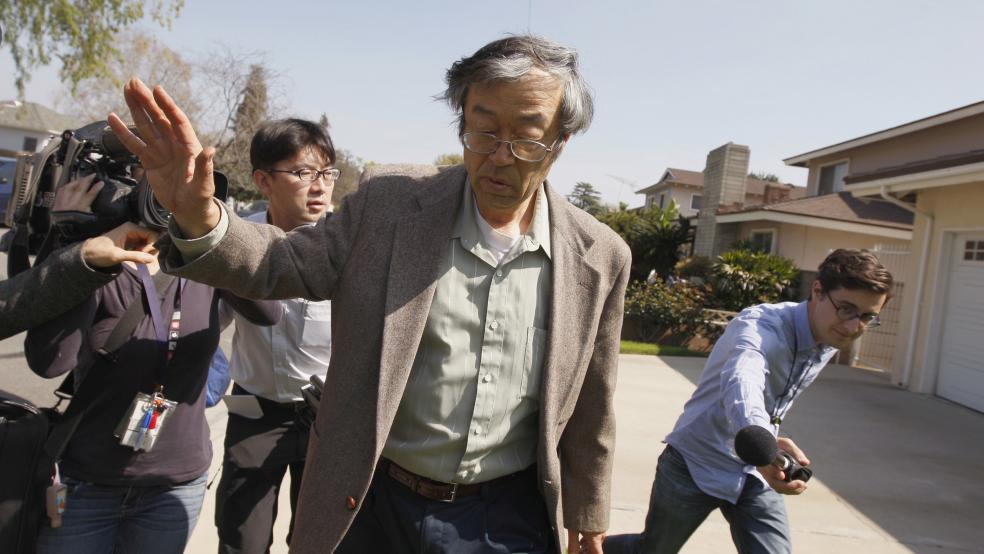Since Leah McGrath Goodman’s story hit the slickly designed cover of Newsweek’s print edition this week, both the Internet and the real world have been abuzz about Bitcoin and Satoshi Nakamoto.
Among accusations and wild theories that have been flung around, one question is occasionally raised for a whisper of a second before being immediately drowned in another tidal wave of recriminations and retorts: Why should we care?
Before we answer that, here’s what the fuss is about: The Newsweek cover featured a shadowy figure, clothed in a suit and red tie, with Bitcoin’s distinctive “B” symbol rotated 90 degrees, as if a mask. The bolded headline screamed that they had found the “shadowy figure behind the cryptocurrency” hiding in “plain sight.”
Satoshi Nakamoto, the anonymous creator of the Bitcoin protocol, is a household name in cryptocurrency circles. As well as being the creator and one of the first users of Bitcoin, he was also one of the first Bitcoin “miners” to use their computer’s processing power to verify transactions and earn Bitcoins for their services. While Bitcoin mining is barely profitable now, unless you use highly specialized and very expensive hardware, Satoshi’s early entry into the mining game earned him an estimated 1 million BTC.
Even if he wasn’t an inherently private person - as the Newsweek article thickly implies - this incredible wealth in digital currency is more than enough reason to stay off the radar, lest he become a target for kidnapping and thieves (some speculate that Dong Nguyen, the Vietnamese developer of the $50,000-a-day earning app Flappy Bird, pulled his blockbuster game from the iTunes App Store for similar reasons). Aside from that, the recent scandal and volatility in the Bitcoin universe would make Nakamoto an easy target for angry investors and speculators.
And then, just like that, Dorian Satoshi Nakamoto’s photo appeared in Newsweek, the caption definitively proclaiming that the 64-year-old man in a rumpled grey tracksuit was indeed the man who founded the Bitcoin protocol and set about the cryptocurrency craze.
Related: Bitcoin’s Road to Mainstream Acceptance Just Got Rockier
The reaction was swift and decidedly mixed. Other media outlets rushed to echo the news while online commenters condemned the article for including personal information about Dorian Nakamoto and his family along with photos of his house and car. The firestorm only accelerated when Nakamoto himself spoke to the Associated Press, denying the Newsweek story and claiming that he has never been “in communication with Bitcoins.”
What’s been called “the biggest mystery on the Internet” suddenly became even more mysterious.
The AP interview was followed almost immediately by a post on the P2P Foundation, the website on which Satoshi Nakamoto posted the first research paper that led to the genesis of Bitcoin as we know it today. On the same thread in which the foundation of the world’s first cryptocurrency was laid, a post appeared from Nakamoto’s defunct-since-2011 account, containing five words: “I am not Dorian Nakamoto.” Obviously, this could be Dorian posing as his still-mysterious counterpart, and the owner of the site is still (supposedy) trying to verify its authenticity.
Goodman and Newsweek have stood by the veracity of their story, answering angry tweets and pinging limited evidence back and forth with the Bitcoin community at large.
Why is such scrutiny being placed on a private figure whose sole claim to fame (or infamy, depending on your side of the aisle) is creating a piece of software as an academic exercise years ago? One of the celebrated aspects of the Bitcoin currency is its open-source nature, and Nakamoto himself has been barely involved — at least publicly — for many years. Yet such froth is being churned around his identity that Nakamoto and the one AP reporter he agreed to talk to were hounded from his front door all the way inside the interview location.
This may be par for the course for celebrities and politicians, but for a somewhat portly 64-year-old man whose most notable quirk – until now, that is – was collecting model trains and acting somewhat aloof, it’s a bit of a turn-up.
Even if Newsweek has got it right and uncovered the reclusive genius, it still stands that Nakamoto is now largely irrelevant in the Bitcoin world. If he’s anything in terms of Bitcoin, he’s a figurehead. Now, while his identity may still be relevant to journalists and cryptocurrency enthusiasts, it raises the question of why the public at large should care about Newsweek’s revelations.
Some say that Nakamoto wields unchecked influence over the supposedly egalitarian Bitcoin marketplace through his cybercurrency wealth. Since Nakamoto was one of the earliest miners, he quickly amassed a large stockpile of Bitcoins, which he then held. With this supposed hoard, the argument goes, he holds tremendous sway over the value of the currency, and could destroy it on a whim by dumping his coins. This media coverage finally gives other Bitcoin investors insight into the man who could so easily take away all that he has given.
That could be a legitimate concern, though it seems incredibly unlikely that the man who spent several years and considerable brainpower creating this protocol would want to destroy it in a single series of transactions.
Related: Is Bitcoin the Future of Money or Flash in the Pan?
Obviously, the intrigue and anonymity that has surrounded the reclusive developer — and the fact that he is treated as a deity by hardcore cryptocurrency enthusiasts — creates some curiosity, especially considering that he just might wield such power over the Bitcoin market.
Ultimately, while many of the stories and speculation behind Nakamoto are nothing more than simple voyeurism, knowledge is power, especially from an investment standpoint. If it's true that Bitcoin was created by one person — rather than a team of programmers — it was a product of a person's motivations, quirks and desires. If Dorian Nakamoto is the Nakamoto, gaining insight on him — a man so worshipped by the community — could also help to shed light on Bitcoin's flaws and foibles.
In more practical terms, though, the mystery surrounding Nakamoto is much less important than the grand experiment of Bitcoin itself: starting out as a niche pet project for crypto nuts, evolving into a tool for criminals and the paranoid, and successfully avoiding the jeers and catcalls of "magic Internet money" to break into the mainstream as a potential rival to fiat currency. Yes, it's volatile, and yes, it's subject to fraud and thievery, as the evolving Mt. Gox scandal proves — but the sheer fact that something that didn't exist seven years ago can cause this much excitement today is telling.
No matter the outcome of the Newsweek story, one thing is for sure – Dorian S. Nakamoto’s next few weeks are going to be very interesting indeed.
Top Reads from The Fiscal Times:





